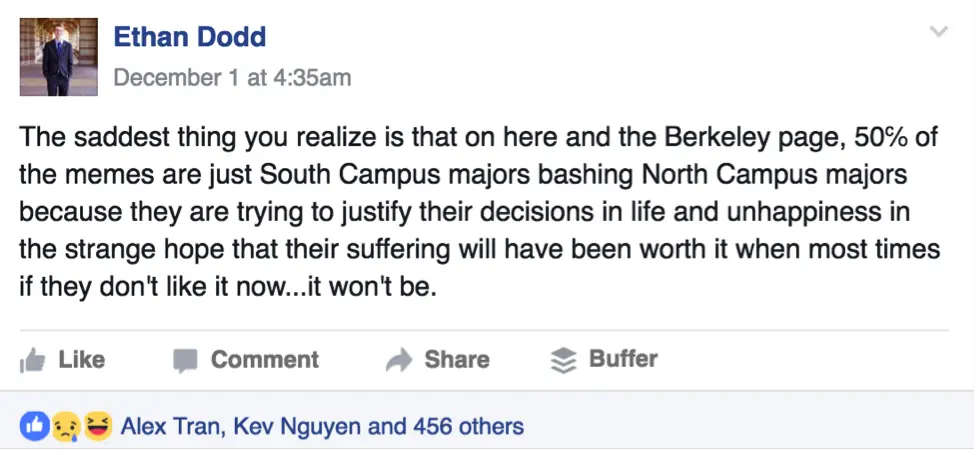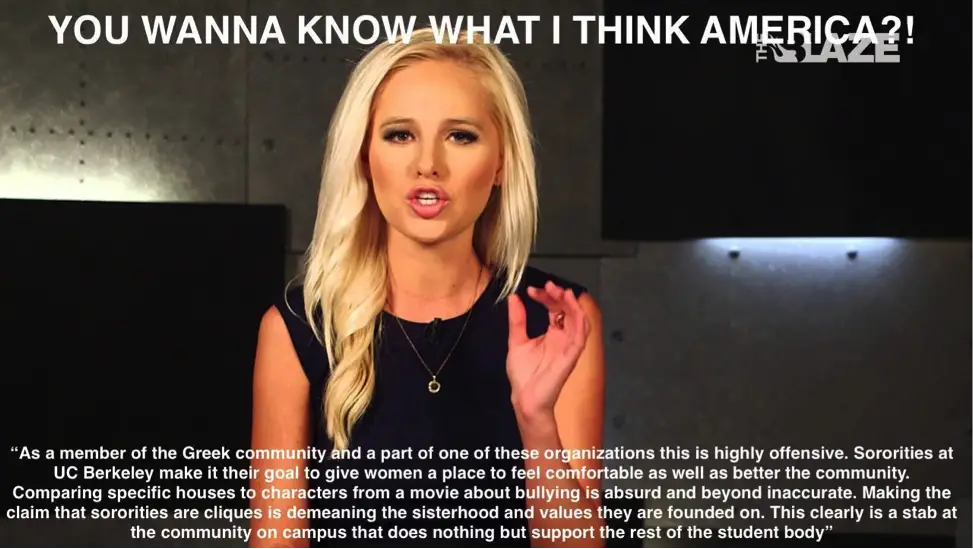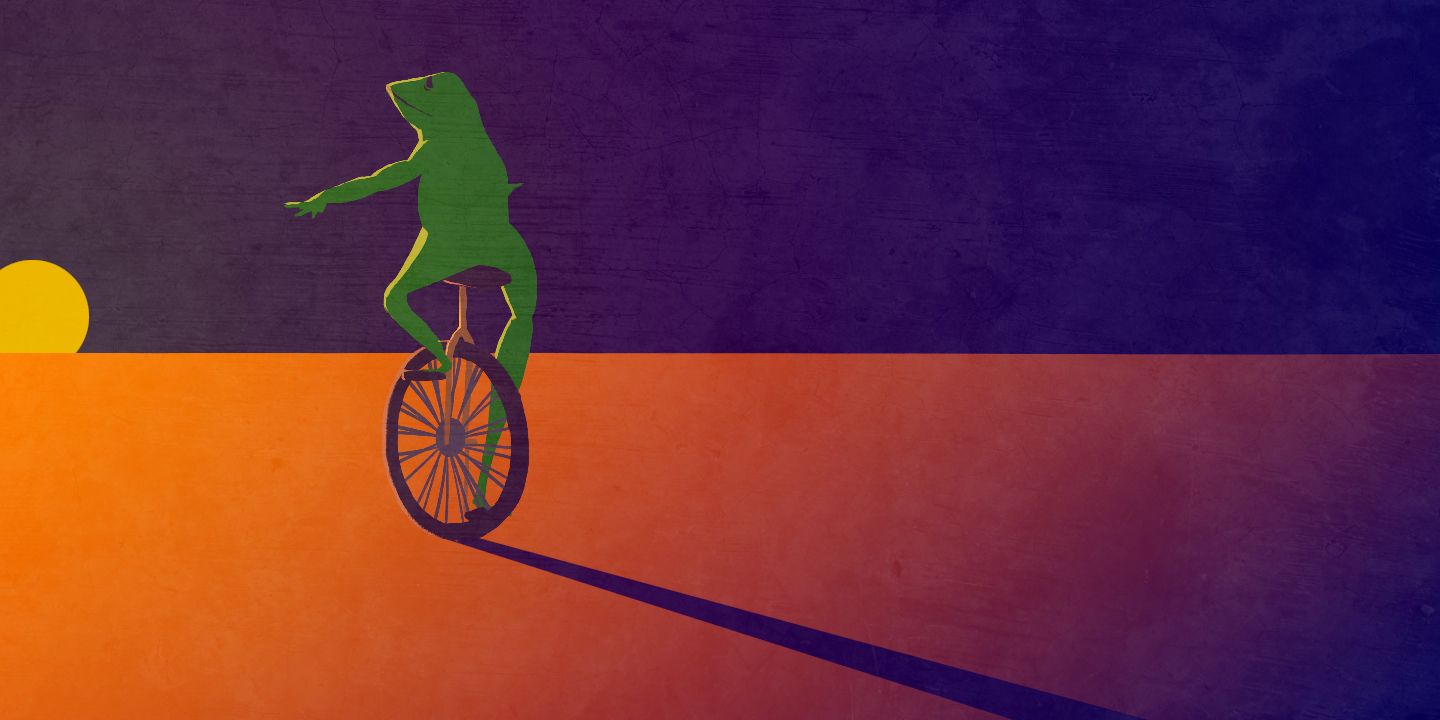What Do U Meme?
As meme culture continues to grow in popularity, college campuses are adopting their own, specific brands of humor.
By Terry Nguyen, University of Southern California
For the latest college trend this semester, students are turning to a new fascination within internet culture: college-related memes featured on Facebook meme “pages” within a university subculture.
The fixation on memes has developed across the nation and has reached schools like UC Berkeley, UC Los Angeles, University of Southern California and Stanford University. These are, however, only a few to name, as the meme craze continues to spread nationwide.
The meme “pages” are actually public Facebook groups that boast over thousands of members, most of whom are students from the university itself. UC Berkeley currently has over 45,000 members within its page, which surpasses the number of its fall enrollment for undergraduate and graduate students.
This detail reveals the overall popularity of the meme culture that extends beyond the school and its students.
What Are Memes?
Many millennials are very familiar with the concept of memes, due to their popular circulation on internet forums and easily “taggable” posts on Facebook, Instagram and Twitter. To those unfamiliar with this social phenomenon, memes would best be described as a humorous piece of online content, usually in the form of an image with text or video, that is copied and rapidly disseminated by internet users across all platforms.
Internet memes have been circulating the virtual sphere since the 1970s, according to Linda K. Borzsei in her research paper detailing the history of the internet meme. She cites the meme as a key component of understanding digital culture, since it largely began as a virtual subculture.
Although this culture has originated since the advent of the internet, Borzsei claims that the pet memes, originated in 2006 featuring “Advice Dog” and “LOLCats,” proved to be “very influential in shaping today’s meme culture.” These memes consist of a humorous image narrated with few lines of bold text, usually dictating an iconic action, emotion or event.
What’s Special about College Memes?
College meme culture separates itself from regular forum-based memes through the satirical and humorous lens it paints on the college experience. Many references or meme reposts represent a specific aspect of university life that is relatable to the students within the school, or more commonly, relatable to college students overall.
The overwhelming popularity of the UC Berkeley meme page, titled “UC Berkeley Memes for Edgy Teens,” suggests that the entertaining nature of the meme community is attractive to not only Berkeley students, but to a majority of others (at least 5,000 members) who don’t attend the institution.
Often times, however, content within the pages can only be relatable to the students on that campus. For example, UC Berkeley’s meme page enjoys poking fun at the EECS (Electrical Engineering and Computer Sciences) majors on campus. Although they exist within one of the most competitive and grueling departments of the school, recurring meme themes constantly portray them as anti-social nerds who often forget to take showers. It addresses topics from the “curve-terror” felt by a majority of the students, to athletic and academic school rivalries.
UCLA and USC’s meme pages also routinely features their respective chancellor (Gene Block) and president (Max Nikias), using existing content from popular memes and placing their school’s representative within it for a humorous twist.
Despite the gaining popularity of many schools’ meme community, not all of these meme pages were built in a day. In UC Los Angeles’ page, titled “UCLA Memes for Sick AF Tweens,” a comment from a student actually helped spike up activity and attention within the page, as more and more individuals joined within hours of his post.
Ethan Dodd, as reported from “The Daily Bruin,” vented his annoyance at how many posts on the meme page are consistently by “South-campus majors bashing North-campus majors.” His long-winded comment was then satirically duplicated through a series of memes which attempted to make light of what was originally a serious post.
Dodd shares with the Daily Bruin that he thinks the post will be “something funny to look back on,” and knows that there were no mean intentions behind the widespread reposting. Within hours of Dodd’s comment, it became an immediate trend to come up with a quirky, original meme to include it in, and the situation was strangely iconic, as members began to copy and paste his post within the comments section of other memes.
The “reposting satire” of serious comments through memes spread like wildfire — not only within UCLA’s page, but eventually to UC Berkeley’s as well. On December 4th, an arguably controversial meme gained attention in the page by representing several Greek sororities as characters within “Mean Girls.” The post stated, “After graduating from North Shore High School, the Plastics enrolled at UC Berkeley, where they all found new cliques.”

As with many controversial posts on the internet, the meme received hundreds of comments, with members chiming in their thoughts on the meme’s depiction of Greek culture. One comment became notorious in its half-hearted attempt to defend the reputation of Greek life and was subjected to hundreds of reposts through comments and memes within the next day.
The comment, which started off with, “As a member of the Greek community…” quickly became the Ethan Dodd meme of the UC Berkeley page, as the “Mean Girls” meme gained over 5,000 likes on the page. Within the next 24 hours, hundreds of memes were reposting the “Greek community” comment, although compared to Dodd’s situation, these carried a satirical, mocking tone of voice.
 The meme community has created a unique subculture within college life that has altered perceptions of a school’s student population. By sharing satirical jokes and humorous memes over one’s personal struggle, the community brings like-minded individuals closer to each other by creating an entertaining shared space for all.
The meme community has created a unique subculture within college life that has altered perceptions of a school’s student population. By sharing satirical jokes and humorous memes over one’s personal struggle, the community brings like-minded individuals closer to each other by creating an entertaining shared space for all.


















[…] anyone older than 30, this may require translation. A complete explanation can be found here: https://studybreaks.com/2016/12/19/meme-culture/; my summary follows, quoting liberally from the […]
[…] For anyone older than 30, this may require translation. A complete explanation can be found here: https://studybreaks.com/2016/12/19/meme-culture/; my summary follows, quoting liberally from the […]